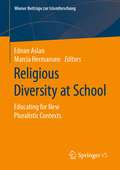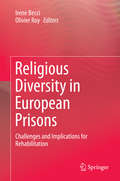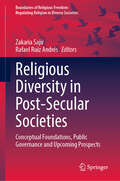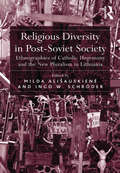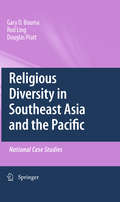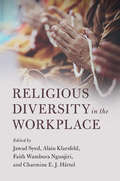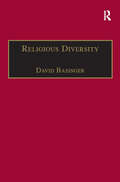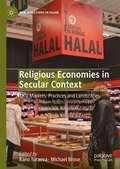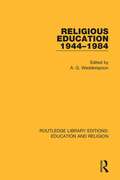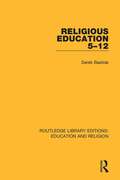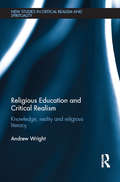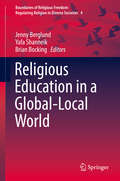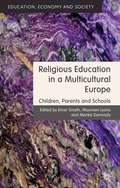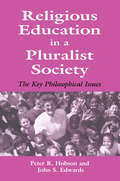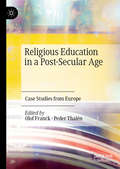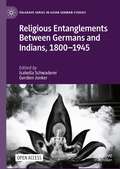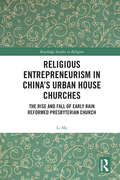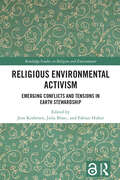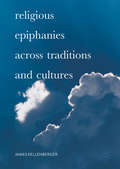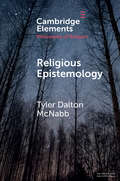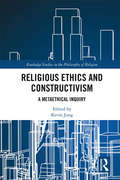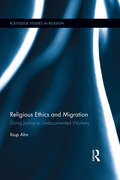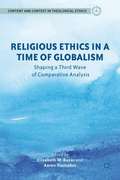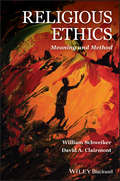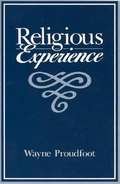- Table View
- List View
Religious Diversity at School: Educating for New Pluralistic Contexts (Wiener Beiträge zur Islamforschung)
by Ednan Aslan Marcia HermansenThis volume features chapters by international experts in education, sociology, and theology who consider a range of challenges faced by educators in primary and secondary schools that are becoming increasingly diverse in terms of the ethnic and religious backgrounds of pupils. From the non-religious, to the refugee, to student fundamentalism and even radicalization—these multiple, fresh approaches analyze the dynamics of the changing pedagogical landscape in an age of ever increasing globalization and cultural plurality. Today’s classrooms are often the most crucial spaces where children and adolescents encounter new cultural, religious, and other worldviews. Increasingly, teachers are called on to empower their pupils with the tools and competencies necessary to reflect on and process this plurality in ways that are productive for their intellectual growth and moral maturation. Regional case studies provide extensive data while offering insights into developments in school settings across Europe, in Turkey, and in the United States. In addition, a number of the contributions address the delivery, content, and policies of Islamic Religious Education in European contexts, the educational strategies employed in multi-religious societies, and interreligious dialogue in schools, whether intentional or spontaneous.
Religious Diversity in European Prisons
by Olivier Roy Irene BecciThis book examines how prisons meet challenges of religious diversity, in an era of increasing multiculturalism and globalization. Social scientists studying corrections have noted the important role that religious or spiritual practice can have on rehabilitation, particularly for inmates with coping with stress, mental health and substance abuse issues. In the past, the historical figure of the prison chaplain operated primarily in a Christian context, following primarily a Christian model. Increasingly, prison populations (inmates as well as employees) display diversity in their ethnic, cultural, religious and geographic backgrounds. As public institutions, prisons are compelled to uphold the human rights of their inmates, including religious freedom. Prisons face challenges in approaching religious plurality and secularism, and maintaining prisoners' legal rights to religious freedom. The contributions to this work present case studies that examine how prisons throughout Europe have approached challenges of religious diversity. Featuring contributions from the UK, France, Italy, Germany, Switzerland, The Netherlands, Belgium and Spain, this interdisciplinary volume includes contributions from social and political scientists, religion scholars and philosophers examining the role of religion and religious diversity in prison rehabilitation. It will be of interest to researchers in Criminology and Criminal Justice, Social and Political Science, Human Rights, Public Policy, and Religious Studies.
Religious Diversity in Post-Secular Societies: Conceptual Foundations, Public Governance and Upcoming Prospects (Boundaries of Religious Freedom: Regulating Religion in Diverse Societies)
by Zakaria Sajir Rafael Ruiz AndrésThis book offers a multidisciplinary exploration of one of the defining characteristics of post-secular societies: religious diversity. Drawing from the sociology of religion, the sociology of migration, and related fields, it critically examines the interaction between religion, diversity, and secular governance, challenging conventional approaches to managing pluralism in contemporary contexts. Organized into three sections, the book explores: Theoretical and Conceptual Foundations: Establishing core frameworks for understanding post-secularization, pluralistic societies, and the intricate dynamics between religion and diversity. Regulating Religion in Postsecular and Diverse Societies: Analyzing policy innovation, comparative case studies, and practical challenges in managing religious diversity within secular governance structures. Navigating the Future: Prospects and Challenges of Diversity Governance in Post-Secular Contexts: Addressing emerging trends such as digital transformations, the politicization of religious identities, and the evolving role of religious traditions in fostering inclusivity and resilience. Featuring contributions from leading scholars and emerging researchers, this volume provides a multidimensional perspective on debates spanning sociology, anthropology, law, and public policy. Through socio-historical examples and case studies, it examines pressing topics such as religious pluralism in secular governance, diversity management strategies, and the transformative impact of digital technologies on religious expression. At its core, the book is framed by two key concepts: post-secularization and diversity. It reexamines religion&’s evolving role in secularized societies, taking religious plurality—not the disappearance of religion—as a starting point for exploring secularity. This work is an essential resource for students, researchers, educators, policymakers, and professionals seeking actionable insights into critical debates on religion, migration, diversity, and secular governance in today&’s globalized and digitalized world.
Religious Diversity in Post-Soviet Society: Ethnographies of Catholic Hegemony and the New Pluralism in Lithuania
by Ingo W. Schröder Milda AlišauskieneSince the end of state repression against religion, two major processes have taken place in the formerly socialist countries: historically dominant churches strive to reassert their position in society, while new religious groups and ideas from various parts of the world are proliferating. This generates pluralism of religious communities and individual religious attitudes. Religious Diversity in Post-Soviet Society presents the first collection of ethnographies of this new religious diversity for Lithuania, a country that has a long history of a dominant Catholic Church. The authors reveal how Catholicism has become increasingly diversified and other religions (Charismatic Protestantism, Baltic Paganism, Eastern religions and other alternative spiritualities) are claiming their space in the religious field.
Religious Diversity in Southeast Asia and the Pacific
by Gary D. Bouma Rodney Ling Douglas PrattReligious diversity is now a social fact in most countries of the world. While reports of the impact of religious diversity on Europe and North America are reasonably well-known, the ways in which Southeast Asia and Asia Pacific are religiously diverse and the ways this diversity has been managed are not. This book addresses this lack of information about one of the largest and most diverse regions of the world. It describes the religious diversity of 27 nations, as large and complex as Indonesia and as small as Tuvalu, outlining the current issues and the basic policy approaches to religious diversity. Southeast Asia and the Pacific Islands are portrayed as a living laboratory of various religious blends, with a wide variance of histories and many different approaches to managing religious diversity. While interesting in their own right, a study of these nations provides a wealth of case studies of diversity management - most of them stories of success and inclusion.
Religious Diversity in the Workplace
by Jawad Syed Alain Klarsfeld Härtel Charmine E. J. Faith Wambura NgunjiriEmployees bring their beliefs and religious values to work, and this can be a source of either positive performance or negative conflict. Social conflicts around religion impact more than societies and communities. They also impact organizations. 'Anti-religion' sentiments tend to be based on the perception that religion can be neatly separated from the 'more acceptable/palatable' spirituality, but this ignores the fact that - for most people - the two are intimately intertwined and inseparable. As religious identity is salient for a majority of the world's population, it is thus an important aspect of organizations - particularly those with a large and diverse body of employees. <P><P>This handbook provides a timely and necessary analysis of religious diversity in organizations, investigating the role of national context, the intersections of religion with ethnicity and gender, and approaches to diversity management.<P> The diverse team of editors and contributors ensures various viewpoints and a larger pool of arguments.<P> Explains the institutional, ideological, cultural, national, historical and demographic context and implications of religious diversity at work.<P> Emphasizes religion, in addition to the Anglo-American view of spirituality and faith, without treating religion as divisive.
Religious Diversity: A Philosophical Assessment (Routledge Philosophy of Religion Series)
by David BasingerReligious diversity exists whenever seemingly sincere, knowledgeable individuals hold incompatible beliefs on the same religious issue. Diversity of this sort is pervasive, existing not only across basic theistic systems but also within these theistic systems themselves. Religious Diversity explores the breadth and significance of such conflict. Examining the beliefs of various theistic systems, particularly within Christianity, Judaism, Hinduism and Buddhism, Basinger discusses seemingly incompatible claims about many religious issues, including the nature of God and the salvation of humankind. He considers particularly the work of Hick, Gellman, Plantinga, Schellenberg, Alston, Wainwright, and Quinn, applying their perspectives on 'exclusivism' and 'pluralism' as they become relevant to the issues in question. Basinger's survey of the relevant literature, proposed solutions, and fresh insights offer an invaluable contribution not only for philosophers of religion and philosophical theologians but for anyone interested in the increasingly significant question of what a religious believer can or cannot justifiably say about their religious perspective.
Religious Economies in Secular Context: Halal Markets, Practices and Landscapes (New Directions in Islam)
by Rano Turaeva Michael BroseThis edited collection is one of the few sociological and anthropological studies of Halal markets. The chapters inquire into the legal and religious aspects of Halal markets in non-Muslim contexts or the countries where the label 'Halal' matters, and is not taken for granted as it is the case in most of the Muslim world where it is an accepted norm. In many countries, 'Halal' has become a type of brand used to market food and cosmetic products. This is an effective marketing strategy because it appeals directly to Muslims, but also increasingly to non-Muslims who seek pure, fresh products. In this case 'Halal' implies attributes similar to other brands where quality and purity is guaranteed, such as Fair Trade, Bio or organic in the US and Europe, but with the additional appeal to prospective Muslim consumers that it satisfies Islamic norms.The book consists of contributions on Halal economies in non-Muslim societies dealing with such dilemmas as rational thinking and halal philosophy within various fields of halal economy such as regulation, production, marketing, service delivery and consumption.
Religious Education 1944-1984 (Routledge Library Editions: Education and Religion #10)
by A. G. WedderspoonFirst published in 1966. Under the 1944 Act, the only compulsory school subject was Religious Instruction. Books and research findings revealed a critical situation, and many educationalists, churchmen and parents believed a review of the problem was vital. This book presents the considered views of a group of distinguished educationalists who met in London in April 1965 under the auspices of the Institute of Education. It also includes the comments by members of Parliament, church leaders, university and school teachers who were present and the whole contains a frank and valuable expression of expert opinion upon a very controversial subject.
Religious Education 5-12 (Routledge Library Editions: Education and Religion #2)
by Derek BastideFirst published in 1987. The book is intended for class teachers (and trainee teachers) in primary schools who wish to teach religious education well but are unclear as to how they might. Firstly, this book maps out the changes that had taken place with regard to changing aims and objectives in the subject; children and their understanding of religion; and the broadening understanding of the notion of religion and considers the implications of these for the teacher. Secondly, it investigates ways in which the teacher can approach religion in the classroom. It develops five complementary approaches: thematic work, world religions, festivals, the Bible and biography. These are illustrated with numerous examples. There are also many accounts of successful pieces of teaching. Thirdly, the book recognizes that many teachers are not confident themselves in the world of religion and attempts to provide information and understanding at the teacher’s own level. Overall the book sets out to be a straightforward, practical guide to the primary classroom teacher. It aims to provide a framework (rather than a straitjacket) in which teachers of different styles and from different backgrounds can work.
Religious Education and Critical Realism: Knowledge, Reality and Religious Literacy (New Studies in Critical Realism and Spirituality (Routledge Critical Realism))
by Andrew WrightReligious Education and Critical Realism: Knowledge, Reality and Religious Literacy seeks to bring the enterprise of religious education in schools, colleges and universities into conversation with the philosophy of Critical Realism. This book addresses the problem, not of the substance of our primal beliefs about the ultimate nature of reality and our place in the ultimate order-of-things, but of the process through which we might attend to questions of substance in more attentive, reasonable, responsible and intelligent ways. This book unpacks the impact of modern and post-modern thought on key topics whilst also generating a new critically realistic vision. Offering an account of the relationship between Religious Education and Critical Realism, this book is essential reading for students, scholars and practitioners interested in philosophy, theology and education.
Religious Education in a Global-Local World
by Jenny Berglund Yafa Shanneik Brian BockingThis book examines Religious Education (RE) in over ten countries, including Australia, Indonesia, Mali, Russia, UK, Ireland, USA, and Canada. Investigating RE from a global and multi-interdisciplinary perspective, it presents research on the diverse past, present, and possible future forms of RE. In doing so, it enhances public and professional understanding of the complex issues and debates surrounding RE in the wider world. The volume emphasizes a student-centred approach, viewing any kind of 'RE', or its absence, as a formative lived experience for pupils. It stresses a bottom-up, sociological and ethnographic/anthropological research-based approach to the study of RE, rather than the 'top down' approaches which often start from prescriptive legal, ideological or religious standpoints. The twelve chapters in this volume regard RE as an entity that has multiple and contested meanings and interpretations that are constantly negotiated. For some, 'RE' means religious nurturing, either tailored to parental views or meant to inculcate a uniform religiosity. For others, RE means learning about the many religious and non-religious world-views and secular ethics that exist, not promoting one religion or another. Some seek to avoid the ambiguous term 'religious education', replacing it with terms such as 'education about religions and beliefs' or 'the religious dimension of intercultural education'.
Religious Education in a Multicultural Europe
by Emer Smyth Maureen Lyons Merike DarmodyDrawing on a major EU-funded research project, this book examines how religious/secular beliefs are formed at school and in the family across different European countries, offering insights into key policy issues concerning the place of religion in the school system and illuminating current debates around religion and multiculturalism.
Religious Education in a Pluralist Society: The Key Philosophical Issues
by John Edwards Peter R. HobsonReligious education in liberal pluralist societies such as the UK, the USA, and Australian underwent radical change in the 1980s and 1990s, with a major shift towards multi-faith, educationally oriented programmes. This has meant significant modifications to both the content and the methodology of religious-education courses and to the way they are conceived of and taught in schools and universities.One important implication of this change for the teaching and study of religion today is the need for a philosophical dimension that deals with issues such as the truth status of religious statements and the moral acceptability of religious claims. This dimension is often insufficiently developed; this lack is made more critical by the multiple competing truth claims of various religions, giving rise to such contentious problems as the growth of fundamentalism, increasing religious intolerance and conflict, and differences of opinion on central moral problems such as birth control, abortion and euthanasia. This text attempts to provide the philosophical underpinning that the study and teaching of religion in modern societies requires.
Religious Education in a Post-Secular Age: Case Studies from Europe
by Olof Franck Peder ThalénThis book analyzes the changes and shifts in religious education in Europe over the past 50 years. In a post-secular age, it has become increasingly difficult to make sharp distinctions between what is religious and non-religious, confessional and non-confessional. Reforms in religious education in Sweden in the 1960s appeared as part of a process of wider secular liberalization, giving more credence to the idea of absolute neutrality in religious education. However drastic shifts in society, culture and the European religious landscape raise the need for a reevaluation of the foundations of religious education. Drawing on a range of case studies from across Europe, this book will appeal to students and scholars of religious education as well as post-secular education more generally.
Religious Entanglements Between Germans and Indians, 1800–1945 (Palgrave Series in Asian German Studies)
by Gerdien Jonker Isabella SchwadererReligion as a form of cultural expression constitutes a critical element in the relationship between Germany and India. The discovery of Indian traditions in Germany and re-interpretations of those traditions in India fueled not only new theological and philosophical explorations, but also extensive innovations in the fields of music, dance, bodily experience, and political intervention. Seeking to uncover the enfolding of colonial thought structures through presentations of the Self, while placing them in the context of global colonial value chains that connected the peripheries with the centre, this interdisciplinary volume addresses India through the lens of an entangled relationship. Adopting the position that the acceleration of communication, technical development, and colonisation locally triggered re-interpretations of the religious sphere, This volume takes a look at the period from 1800 to the end of National Socialism, tracing the strands of an Indo-Germanic religion in the making as it goes along. A special emphasis is placed on the artistic expressions of religious experience including re-enactments of musical compositions and dance configurations, which were created to embody India in Germany.This is an open access book.
Religious Entrepreneurism in China’s Urban House Churches: The Rise and Fall of Early Rain Reformed Presbyterian Church (Routledge Studies in Religion)
by Li MaThis book offers a unique historical documentation of the development of the ambitious religious entrepreneurism by leaders of the Early Rain church (and later Western China Presbytery leadership), in an effort to gain social influence in China through local institution-building and global public image management. It unravels the social processes of how this Christian community with a public image of defending religious freedom in China was undermined by an internal loss of moral authority. Based on publicly available texts from Chinese social media that aren’t readily available in the West as well as in-depth interviews, it is framed by existing scholarship in social theories of the public sphere, charismatic domination in social transition, and the role of power in organizational behaviour. These churches’ stories show how Christianity, which has long been politically marginalized in communist China, has not only adapted and challenged the socio-political status quo, but how it was also ironically shaped by the political culture. This is an insightful and critical ethnographic study of one of modern China’s most famous house churches. As such, it will be of great interest to scholars of Religion in China as well as those working in Religious Studies, Asian studies, Chinese studies, and Mission Studies more generally.
Religious Environmental Activism: Emerging Conflicts and Tensions in Earth Stewardship (Routledge Studies in Religion and Environment)
by Jens Koehrsen Julia Blanc Fabian HuberThis volume explores how religious and spiritual actors engage for environmental protection and fight against climate change. Climate change and sustainability are increasingly prominent topics among religious and spiritual groups. Different faith traditions have developed "green" theologies, launched environmental protection projects and issued public statements on climate change. Against this background, academic scholarship has raised optimistic claims about the strong potentials of religions to address environmental challenges. Taking a critical stance with regard to these claims, the chapters in this volume show that religious environmentalism is an embattled terrain. Tensions are an inherent part of religious environmentalism. These do not necessarily manifest themselves in open clashes between different parties but in different actions, views, theologies, ambivalences, misunderstandings, and sometimes mistrust. Keeping below the surface, these tensions can create effective barriers for religious environmentalism. The chapters examine how tensions are manifested and dealt with through a range of empirical case studies in various world regions. Covering different religious and spiritual traditions, they reflect on intradenominational, interdenominational, interreligious, and religious-societal tensions. Thereby, this volume sheds new light on the problems that religions face when they seek to take an active role in today’s societal challenges.
Religious Epiphanies Across Traditions and Cultures
by James KellenbergerThis book explores religious epiphanies in which there is the appearance of God, a god or a goddess, or a manifestation of the divine or religious reality as received in human experience. Drawing upon the scriptures of various traditions, ancillary religious writings, psychological and anthropological studies, as well as reports of epiphanic experiences, the book presents and examines epiphanies as they have occurred across global religious traditions and cultures, historically and up to the present day. Primarily providing a study of the great range of epiphanies in their phenomenal presentation, Kellenberger also explores issues that arise for epiphanies, such as the matter of their veridicality (whether they are truly of or from the divine) and the question of whether all epiphanies are of the same religious reality.
Religious Epistemology (Elements in the Philosophy of Religion)
by Tyler Dalton McNabbIf epistemology is roughly the study of knowledge, justification, warrant, and rationality, then religious epistemology is the study of how these epistemic concepts relate to religious belief and practice. This Element, while surveying various religious epistemologies, argues specifically for Plantingian religious epistemology. It makes the case for proper functionalism and Plantinga's AC models, while it also responds to debunking arguments informed by cognitive science of religion. It serves as a bridge between religious epistemology and natural theology.
Religious Ethics and Constructivism: A Metaethical Inquiry (Routledge Studies in the Philosophy of Religion)
by Kevin JungIn metaethics, there is a divide between those who believe that there exist moral facts independently of human interests and attitudes (i.e., moral realists) and those who don’t (i.e., antirealists). In the last half century, the field of religious ethics has been inundated with various antirealist schools of moral thought. Though there is a wide spectrum of different positons within antirealism, a majority of antirealist religious ethicists tend to see moral belief as an historically dependent social construction. This has created an environment where doing religious ethics in any metaphysically substantial sense is often seen not only as out of fashion but also as philosophically implausible. However, there is a lack of clarity as to what antirealists exactly mean by "construction" and what arguments they would use to support their views. Religious Ethics and Constructivism brings together a diverse group of scholars who represent different philosophical and theological outlooks to discuss the merits of constructivism vis-à-vis religious ethics. The essays explore four different kinds of constructivism in metaethics: social (or Hegelian) constructivism, Kantian constructivism, Humean constructivism, and theological constructivism. The overall aim of these essays is to foster dialogue between religious ethicists and moral philosophers, and to open the field religious ethics to the insights that can be provided by contemporary metaethics.
Religious Ethics and Migration: Doing Justice to Undocumented Workers (Routledge Studies in Religion)
by Ilsup AhnWhat does it mean to provide justice for undocumented workers who have been living among us without proper legal documentation? How can we do justice to the undocumented migrants who have been doing the low-skilled, low-paid jobs unwanted by citizens? Why should we even try to do justice for people who violate the laws of the society? Religious Ethics and Migration: Doing Justice to Undocumented Workers addresses these questions from a distinctive religious ethical perspective: the Christian theology of forgiveness and radical hospitality. In answering these questions, the author employs in-depth interdisciplinary dialogues with other relevant disciplines such as immigration history, global economics, political science, legal philosophy, and social theory. He argues that the political appropriation of a Christian theology of forgiveness and the radical hospitality modeled after it are the most practical and justifiable solutions to the current immigration crisis in North America. Critical and interdisciplinary in its approach, this book offers a unique, comprehensive, and balanced perspective regarding the urgent immigration crisis.
Religious Ethics in a Time of Globalism
by Elizabeth M. Bucar Aaron StalnakerThis book contains essays on current projects from several rising figures in religious ethics, collected into a field-shaping anthology of new work. As a whole, the book argues that religious ethics should make cultural and moral diversity central to its analysis. This can include three main aspects, in various combinations: first, describing and interpreting particular ethics on the basis of historical, anthropological, or other data; second, comparing such ethics (in the plural), which requires rigorous reflection on the methods and tools of inquiry; and third, engaging in normative argument on the basis of such studies, and thereby speaking to particular moral controversies, as well as contemporary concerns about overlapping identities, cultural complexity and plurality, universalism and relativism, and political problems regarding the coexistence of divergent groups.
Religious Ethics: Meaning and Method (Wiley Blackwell Companions To Religion Ser.)
by David A. Clairmont William SchweikerAn inclusive and innovative account of religious ethical thinking and acting in the world. Rather than merely applying existing forms of philosophical ethics, Religious Ethics defines the meaning of the field and presents a distinct and original method for ethical reflection through comparisons of world religious traditions. Written by leading scholars and educators in the field, this unique volume offers an innovative approach that reveals how religions concur and differ on moral matters, and provides practical guidance on thinking and living ethically. The book’s innovative method—integrating descriptive, normative, practical, fundamental, and metaethical dimensions of reflection—enables a far more complex and nuanced exploration of religious ethics than any single philosophical language, method, or theory can equal. First introducing the task of religious ethics, the book moves through each of the five dimensions of reflection to compare concepts such as good and evil, perplexity and wisdom, truth and illusion, and freedom and bondage in various theological contexts. Guides readers on understanding, assessing, and comparing the moral teachings and practices of world religions Applies a disciplined, scholarly approach to the subject of religious ethics Explores the distinctions between religious ethics and moral philosophy Provides a methodology which can be applied to comparative ethics for various religions Compares religious traditions to illuminate each of the five dimensions of ethical and moral reflection Religious Ethics: Meaning and Method will help anyone interested in the relation between religion and ethics in the modern world, including those involved in general and comparative religion studies, religious and comparative ethics, and moral theory.
Religious Experience
by Wayne ProudfootThis book is about that idea of religious experience which has been so influential in religious thought and the study of religion in the past two centuries. It is an examination of some of the most important theories of religious experience, an elucidation of the idea or concept as it is presupposed by discussions of such topics as mysticism and reductionism in the study of religion, and a consideration of the implications of these theories and this idea for contemporary issues in the philosophy of religion.
